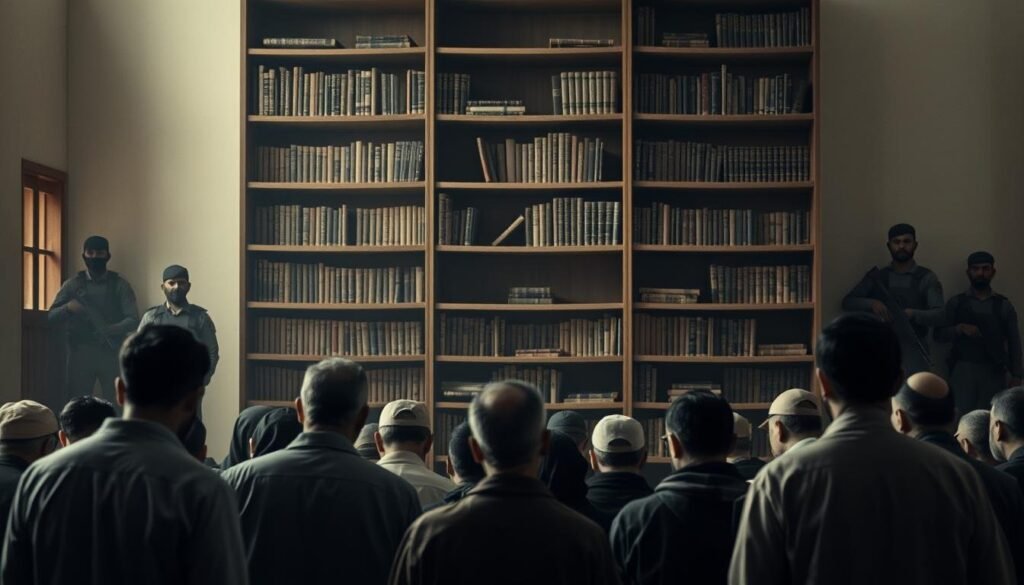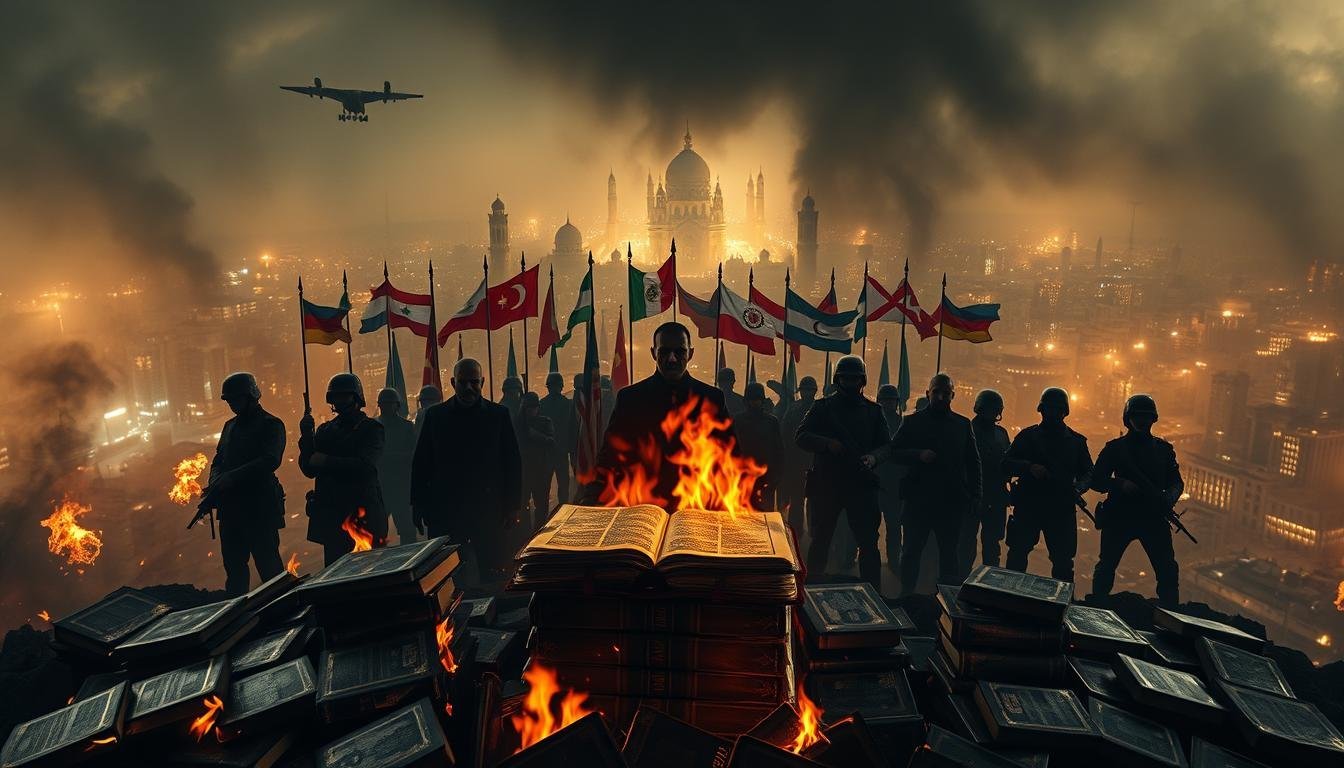Did you know the Bible is banned or restricted in many countries? This happens because people think it threatens local cultures and religions.
Censorship of the Bible takes many forms. It can range from complete bans to limits on its distribution and translation. In some places, the Bible is seen as a challenge to the main religious or cultural story. This leads to it being banned.
As you delve deeper into this topic, you’ll see the complex reasons behind Bible censorship. You’ll also learn about its impact on religious freedom. This knowledge helps us understand the world’s balance between religious tolerance and restriction.
Contents
- 1 The Global Landscape of Biblical Censorship
- 2 Why Is the Bible Banned in 52 Countries? The Core Explanation
- 3 Historical Context: Evolution of Bible Censorship
- 4 Categories of Bible Restrictions Around the World
- 5 Case Studies: Notable Countries Where the Bible Faces Restrictions
- 6 How Bible Bans Impact Religious Communities
- 7 What This Means for Your Religious Freedom
- 8 Conclusion: The Future of Biblical Access in Restricted Nations
- 9 FAQ
- 9.1 Why is the Bible banned in some countries?
- 9.2 How many countries ban or restrict the Bible?
- 9.3 What are the categories of Bible restrictions around the world?
- 9.4 How do Bible bans impact religious communities?
- 9.5 What does the restriction of the Bible mean for my religious freedom?
- 9.6 Are there any efforts to advocate for access to the Bible in restricted nations?
The Global Landscape of Biblical Censorship
Did you know that over 50 countries have laws against the Bible? The world’s approach to the Bible is varied, with each country having its own rules.
It’s shocking to see that the Bible faces bans in more than 50 countries. Some bans are harsher than others. Countries with strict religious laws or seeing Christianity as a threat often impose these restrictions.
Why do these restrictions happen? They often come from politics, religion, or social issues. Here are some important points about Bible bans worldwide:
- More than 50 countries have laws against the Bible.
- Some places have strict rules against Christian books.
- The severity of these restrictions can vary greatly.
Knowing about global Bible bans helps us understand their impact on religious groups around the world.
Why Is the Bible Banned in 52 Countries? The Core Explanation
It might shock you to know the Bible is banned in 52 countries. This is mainly because it talks about freedom and equality. The Bible’s focus on individual rights and equality is seen as a danger by many governments that like to control everything.
Freedom Concepts in Scripture
The Bible says everyone is equal and has rights that can’t be taken away. This idea is a big problem for governments that like to keep people in their place. For example, Galatians 3:28 says, “There is neither Jew nor Gentile, neither slave nor free, nor is there male and female, for you are all one in Christ Jesus.”
This verse talks about being united and equal, which goes against systems that treat some people unfairly. So, governments that keep power by controlling people see the Bible as a threat.
Equality Principles That Threaten Hierarchical Systems
The Bible’s message of equality isn’t just for spiritual matters. It also affects how we organize society and politics. The idea that everyone is equal before God shakes up systems where a few hold all the power.
| Principle | Biblical Reference | Impact on Hierarchical Systems |
|---|---|---|
| Equality before God | Galatians 3:28 | Challenges social and economic hierarchies |
| Love your neighbor | Mark 12:31 | Fosters community and cooperation over competition |
| Do not oppress the foreigner | Exodus 22:21 | Protects the rights of marginalized groups |
The effects of these teachings are huge. They push for a society based on respect and fairness, not fear and control. Knowing this helps us understand why some governments see the Bible as a danger to their rule.
Historical Context: Evolution of Bible Censorship
For centuries, the Bible has faced censorship because of its big impact on society and politics. It’s interesting to see how Bible bans have evolved over time. This is closely linked to the growth of religious freedom.
The early Christian Church went through a lot of persecution. Later, some versions of the Bible were banned by those in power. Knowing this history helps us understand why Bible censorship still happens today.
| Period | Event | Impact on Bible Censorship |
|---|---|---|
| Early Christianity | Persecution by Roman Empire | Increased secrecy around Bible circulation |
| Middle Ages | Control by Catholic Church | Strict regulation of Bible translations |
| Reformation | Emergence of Protestantism | Increased availability of Bible in vernacular languages |
By looking at history, we see why the Bible is banned in 52 countries today. The way we view Bible censorship has changed over time. This change shows how our views on religious freedom and the Bible’s role in society have evolved.
Categories of Bible Restrictions Around the World
Did you know there are many types of Bible restrictions globally? Knowing these categories helps us understand the complex world of biblical censorship.
Biblical restrictions fall into three main types: outright bans, restrictions on distribution, and limitations on practice. Outright bans mean the Bible is completely banned in a country or area. Restrictions on distribution limit how Bibles can be shared, like needing special permits. Limitations on practice restrict how biblical teachings are followed or shared.
- Outright Bans: Countries that completely ban the Bible, often due to it being seen as a threat to the dominant religion or political ideology.
- Restrictions on Distribution: Regulations that control how Bibles are sold, distributed, or imported, often requiring special permissions.
- Limitations on Practice: Laws or social norms that restrict the practice of Christianity, such as prohibiting public worship or evangelism.
These categories often overlap. For example, a country might ban some Bible versions but limit others’ distribution.
By understanding these categories, we can better see the impact of Bible restrictions on religious freedom globally.
Case Studies: Notable Countries Where the Bible Faces Restrictions
The Bible, a widely read religious text, faces significant restrictions in various parts of the world. You are about to explore some notable examples.
North Korea is one of the most prominent examples of a country with strict Bible bans. The regime views Christianity as a threat to its authority, leading to severe persecution of Christians. Possessing a Bible can result in imprisonment or even death.
China is another country where the Bible faces restrictions. While the government allows the sale of Bibles, it tightly controls the distribution and printing. The government-sanctioned Three-Self Patriotic Movement is the only authorized entity to publish and distribute Bibles, leading to a thriving underground market for unauthorized Bibles.
In certain Middle Eastern nations, the Bible is not banned outright, but its distribution is heavily regulated. For instance, in Saudi Arabia, public practice of Christianity is illegal, and proselytizing is punishable by death.
| Country | Nature of Restriction | Consequence of Possession |
|---|---|---|
| North Korea | Strict ban on Bibles | Imprisonment or death |
| China | Controlled distribution | Persecution for unauthorized possession |
| Saudi Arabia | Public practice illegal | Punishable by death for proselytizing |
These case studies illustrate the diverse ways in which the Bible is restricted around the world. Understanding these restrictions is crucial for appreciating the global landscape of religious freedom.
How Bible Bans Impact Religious Communities
When governments ban the Bible, it deeply affects religious groups that depend on it for spiritual guidance. You might ask how these bans change the lives of believers. The truth is, Bible bans often lead to persecution and make it hard for people to openly practice their faith.

The effects on religious communities are wide-ranging. Bans don’t just limit access to religious texts; they also create fear and mistrust. Believers might face religious persecution, making it hard to gather, worship, and share their faith. This can make community members feel isolated.
Moreover, the impact of Bible bans goes beyond the religious community. It can also harm the social fabric of society, causing more tension between different groups. It’s important to understand these effects to see how Bible bans really change religious communities.
What This Means for Your Religious Freedom
Global restrictions on the Bible might seem far away, but they matter a lot to your religious freedom. When some countries limit or ban religious texts, it sets a bad example. This can harm religious liberties everywhere.
It’s important to understand the impact of Bible bans on your faith and community. The table below shows countries where the Bible is restricted and how it affects religious freedom.
| Country | Type of Restriction | Implication |
|---|---|---|
| North Korea | Complete ban | Severe persecution of Christians |
| China | Regulated distribution | Limited access to religious texts |
| Saudi Arabia | Restrictions on public practice | Private worship allowed but public expression limited |
These restrictions hurt not just local people but also your right to practice your faith freely. By knowing about these challenges, you can see why defending religious freedom worldwide is so crucial.
The issue of Bible bans is not just about far-off places. It’s about the basic right to practice your faith, which affects you directly. Your freedom to practice your faith is linked to the global landscape of religious tolerance.
Conclusion: The Future of Biblical Access in Restricted Nations
The future of Bible access in restricted nations is a big concern. Communities facing religious freedom restrictions wonder what’s ahead. Organizations are working hard to help these communities.
These groups are key in making the Bible available in restricted areas. They provide support and resources to those in need. Their work is crucial for the Bible’s future in these places.
By supporting these organizations, you help keep the Bible accessible worldwide. The fight for religious freedom is ongoing. Your support is vital for those facing persecution.
FAQ
Why is the Bible banned in some countries?
The Bible is banned in many countries because it challenges local cultures and religions. It also threatens authoritarian regimes. Its teachings on freedom and equality are seen as a threat to their power.
How many countries ban or restrict the Bible?
Reports show the Bible is banned or restricted in over 52 countries. Some bans are more severe than others.
What are the categories of Bible restrictions around the world?
Bible restrictions fall into several types. These include outright bans, restrictions on distribution, and limitations on practice. These restrictions affect religious communities’ ability to access and practice their faith.
How do Bible bans impact religious communities?
Bible bans lead to persecution and marginalization of religious communities. They affect believers’ ability to practice their faith. This results in significant challenges and hardships for those living under such restrictions.
What does the restriction of the Bible mean for my religious freedom?
The restriction of the Bible in some countries has broader implications for religious freedom worldwide. It can affect your ability to practice your faith freely. It highlights the importance of advocating for religious freedom.
Are there any efforts to advocate for access to the Bible in restricted nations?
Yes, many organizations are working to support persecuted communities. They advocate for religious freedom. They continue efforts to ensure access to the Bible in restricted nations. They promote the importance of biblical access for religious communities worldwide.

Marcellus Stark is an investigative journalist from San Francisco, USA. He writes about global bans, rules, and unusual laws. He shares clear, interesting, and well-researched stories that help readers understand surprising facts worldwide.

